The Helsinki Commission’s four senior leaders helmed the United States’ bicameral, bipartisan delegation to the 30th Annual Session of the OSCE Parliamentary Assembly last week in Vancouver, Canada. Co-Chairman Senator Ben Cardin (MD), serving as Head of Delegation, was joined by Chairman Joe Wilson (SC-02) as Deputy Head of Delegation as well as Ranking Members Rep. Steve Cohen (TN-09) and Sen. Roger Wicker (MS), alongside six other Members of Congress. The high-level delegation demonstrated the United States’ global leadership role in rallying support for Ukraine’s fight against Russian aggression. At the outset of the Parliamentary Assembly session, the U.S. delegation held a closed-door bilateral meeting with the Ukrainian delegation to synchronize support. The U.S. delegation also voted to establish an Ad Hoc Committee on Ukraine to consolidate and coordinate the Parliamentary Assembly’s manifold activities on Ukraine.
“We are comprised of Democrats, Republicans, House members, and Senate members and we are unified in our support for Ukraine,” Sen. Cardin said, introducing the U.S. delegation at the opening plenary on June 30. Speaking on behalf of the delegation, he told the gathering of more than 225 parliamentarians from 50 countries that “we recognize Ukraine is our front line in the defense of democracy and sovereignty. We stand with democracy and sovereignty. We stand with Ukraine.”

From right: Co-Chairman Sen. Ben Cardin, Ranking Member Sen. Roger Wicker, and Chairman Joe Wilson participate in the 30th Annual Session of the OSCE PA. (Photo Credit: OSCE PA)
Other members of the U.S. delegation included: Representative Lloyd Doggett (TX-37); Representative Gwen Moore (WI-04), Member of the OSCE PA Ad Hoc Committee on Migration; Representative Andy Harris (MD-01); Chair of the OSCE PA General Committee on Political Affairs and Security, Representative Richard Hudson (NC-09); Member of the OSCE PA Ad Hoc Committee on Countering Terrorism, Representative Marc Veasey (TX-33); and Representative Victoria Spartz (IN-05)
Neither the Russian nor the Belarusian delegations attended the meeting. Members of the Russian delegation are subject to Canadian travel sanctions and the delegation has forfeited its voting rights in the Assembly after refusing to pay its national contribution to the PA’s annual budget for 2022-2023.
Demonstrating Resolute Support for Ukraine
Over the course of four days of debate, votes, and bilateral meetings, the United States’ representatives at the Annual Session drew attention to the enormity of Russia’s atrocities in Ukraine and the threat Russian President Vladimir Putin poses to global peace. The Annual Session culminated in the overwhelming adoption of a concluding document, known as the Vancouver Declaration. Contributing to the text of the declaration, the U.S. delegation sponsored three resolutions, known as supplementary items, on combatting antisemitism, on countering the notorious Wagner Group of Russian mercenaries, and on protecting and supporting Ukraine’s women and children. The United States also successfully proposed 23 amendments to other resolutions, including those from the PA’s three general committees as well as supplementary items from other delegations on Belarus, Moldova, and Ukraine. Across these initiatives, the United States called attention to Russian acts of genocide in Ukraine, Belarus’ complicity in Russia’s war on Ukraine, Russia’s practice of energy blackmail, Chinese harassment of dissidents in OSCE participating States, democratic backsliding in the OSCE region, Russia’s occupation of Georgian territory, and the need to reform the global security architecture to prevent further acts of Russian aggression.
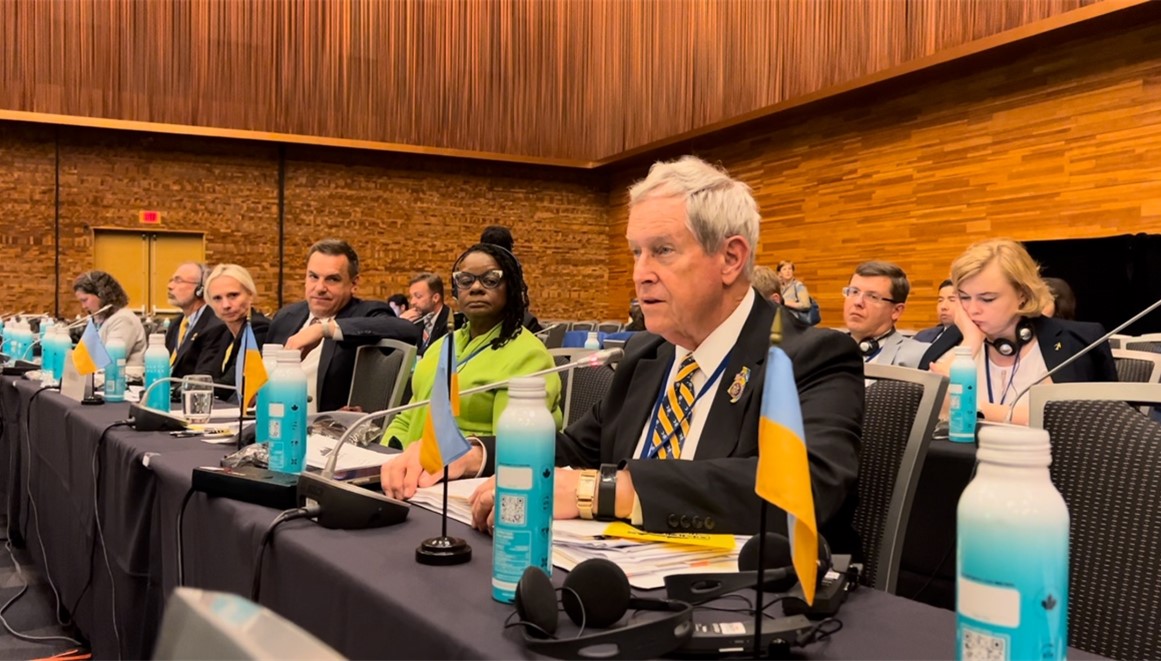
From right: Chairman Joe Wilson, Rep. Gwen Moore, Rep. Richard Hudson, Rep. Victoria Spartz, and Rep. Andy Harris at the opening plenary of the Annual Session in Vancouver. (Photo Credit: CSCE)
Helsinki Commission Chairman Wilson took the floor in the opening plenary to condemn the “genocidal intent” behind Moscow’s assault on civilian infrastructure and women and children in Ukraine. Calling for outright victory for Ukraine, Rep. Wilson observed that “Putin does not negotiate in good faith. He perceives negotiations as an invitation for appeasement.”
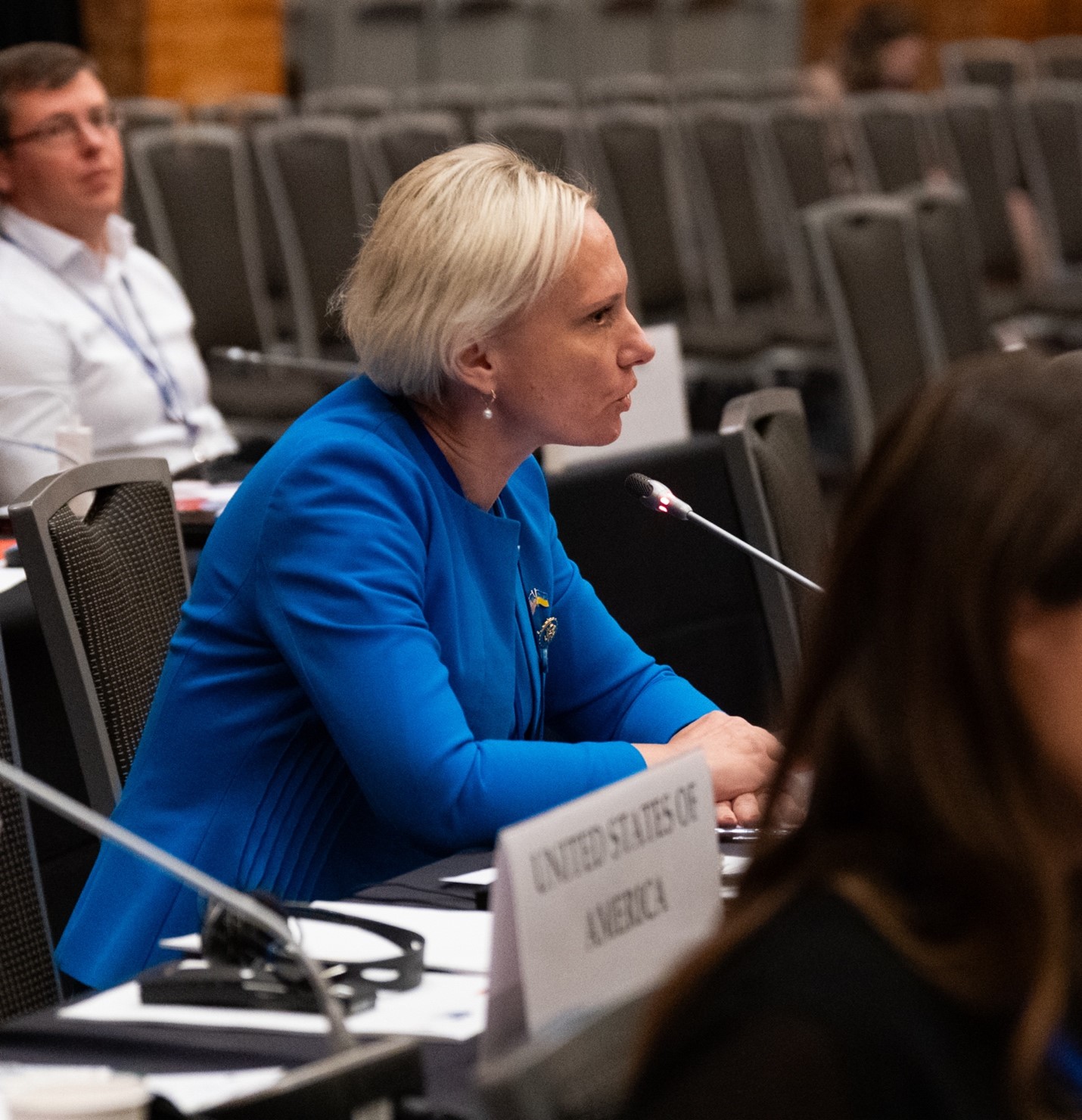
Rep. Victoria Spartz addresses a committee session at the Annual Session. (Photo Credit: OSCE)
Participating in her first Annual Session, newly appointed Commissioner Rep. Victoria Spartz spoke in personal terms about the war in Ukraine: “As someone who was born in Ukraine and spent half of my life there…I understand what a high price the Ukrainian people are paying for their freedoms. But they’re paying this price not just for them but also for each of us.” Rep. Spartz called on OSCE participating States to consider reform of international security mechanisms to create “a framework to deter these brutal atrocities that are happening in Ukraine.”
Countering Russia’s Threats and Bolstering Ukraine’s Resilience
Rep. Richard Hudson chaired the OSCE PA’s General Committee on Political Affairs and Security for the third straight year and used his opening remarks to highlight Russia’s “dangerous rhetoric about using nuclear weapons, on top of its complete disregard for international security mechanisms and military transparency.” In particular, he noted “Russia’s announced withdrawal from the Conventional Forces in Europe treaty…[that] underscores its reckless and bad faith approach to arms control and confidence building measures.” Later in the session, Rep. Hudson easily won reelection to another one-year term as Chairman of the committee, informally known as the First Committee.
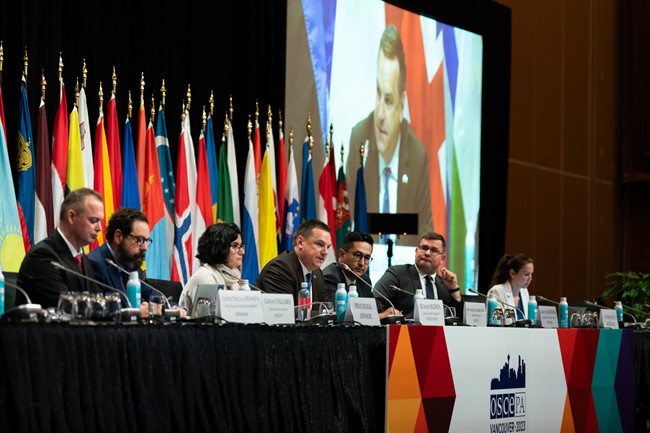
Rep. Richard Hudson chairs the General Committee on Political Affairs and Security. (Photo Credit: OSCE)
The First Committee unanimously adopted a resolution on “The Wagner Group’s Terroristic Nature and Actions” co-sponsored by Rep. Marc Veasey, a member of the OSCE PA Ad Hoc Committee on Countering Terrorism (CCT), and led by Austrian Member of Parliament and CCT Chairman Reinhold Lopatka. Echoing the Holding Accountable Russian Mercenaries Act (HARM Act) in the U.S. Congress, the resolution calls on OSCE participating States to designate the Wagner Group as a foreign terrorist organization to facilitate criminal prosecutions of those involved in the group and enablers provisioning it with financial and material resources. While introducing the text, Rep. Veasey explained how the Wagner Group fits the definition of a terrorist group given its record of “atrocities in furtherance of political ends” committed against noncombatants. He further noted that “the fact that Wagner turned against the regime that birthed it, does not change the fact that this is a terrorist group.”
Former First Committee Chairman and OSCE PA Vice President Sen. Roger Wicker (MS) weighed in during the committee’s opening debate to decry Russia’s practice of “energy blackmail,” including targeting “Ukraine’s basic infrastructure and the energy security of the rest of the continent.” Noting his position as Ranking Member of the Senate Armed Services Committee, Sen. Wicker highlighted the United States’ $130 billion of security, economic and humanitarian assistance to Ukraine since the start of the full-scale invasion and thanked other OSCE countries for contributing to the effort. “Ukraine,” he said, “is not asking us as members of the OSCE to do their fighting for them….they’re simply asking us to give them the financial means and the resources to get the job done.”
U.S. delegates also contributed to the work of the General Committee on Economic Affairs, Science, Technology, and Environment, or Second Committee, by proposing amendments on Ukraine to the committee’s draft resolution. These amendments decried the environmental impact of Russia’s war and its systematic use of energy blackmail as an instrument of malign influence. Pointing toward emerging technologies that could mitigate energy dependence on Russia, Sen. Cardin also presented an amendment authored by Rep. Hudson “encouraging cooperation for the development and adoption of small modular reactors to achieve energy independence and diversification.”
Advocating for Political Prisoners and Protecting Ukrainian Women and Children
In the General Committee on Democracy, Human Rights, and Humanitarian Questions, known as the Third Committee, Rep. Cohen invoked his role as OSCE PA Special Representative on Political Prisoners while paying tribute to political prisoners in Belarus and Russia who face brutal punishment for speaking the truth. “These,” he said, “are the people who evoke the principles of the OSCE: they speak for transparency, they speak for freedom, they speak against autocrats.” In particular, he highlighted the ongoing detention of oppositionists Alexei Navalny and Vladimir Kara-Murza in Russia as well as Siarhei Tsikhanouski in Belarus and called on parliamentarians to use their platforms as elected officials to draw attention to these prisoners and work for their release.
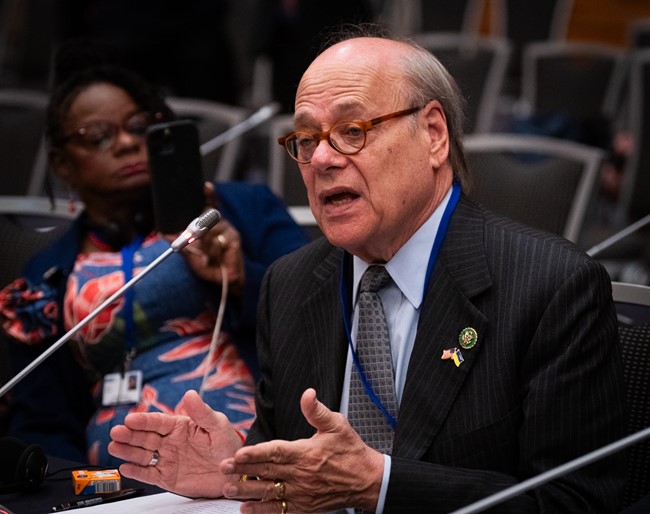
Ranking Member Rep. Steve Cohen addresses a committee meeting at the Annual Session. (Photo Credit: OSCE)
Members of the Third Committee unanimously adopted a U.S. resolution on “Adopting Effective Mechanisms to Safeguard Ukrainian Women and Children from Abuse, Exploitation, and Human Trafficking,” led by OSCE PA Special Representative on Human Trafficking Issues Rep. Chris Smith and co-sponsored by Rep. Wilson. Rep. Wilson introduced the resolution, which calls on OSCE participating States to take specific steps to press for the return of Ukrainian children forcibly taken to Russia and Russian-controlled areas of Ukraine, prevent human trafficking of Ukrainian refugees, most of whom are women and children, and provide resources for trauma treatment for children. “Russia’s brutal and unjustified invasion of Ukraine has exposed the critical need for international action to both save Ukraine’s children and to put in place measures for the future that will protect children, as well as vulnerable refugees, from wartime atrocities and other threats such as human trafficking,” Rep. Wilson told the committee.
Countering the Rise of Antisemitsm
In a plenary session on July 3, Sen. Cardin presented his annual report as OSCE PA Special Representative on Antisemitism, Racism, and Intolerance and introduced a corresponding U.S. resolution on “Rising Antisemitism in the OSCE Region.” Sen. Cardin sounded the alarm that “antisemitism, racism, and intolerance is clearly on the rise across the OSCE region.” To counter this disturbing trend, he called on parliamentarians and OSCE participating States to “lead the fight against hate” by speaking out, preventing the normalization of hateful behaviors, adopting a national strategy such as has recently been done in the United States, strengthening Holocaust education, and deploying OSCE resources designed to address antisemitism and hate-based incidents.
Earlier in the day, Sen. Cardin hosted a well-attended side event titled “Countering the Rise in Antisemitism and Other Hate-Based Incidents: Government Action and Leadership.” The panel discussion featured participation from Susan Heller Pinto, Vice President of International Policy at the Anti-Defamation League (ADL); Matteo Mecacci, Director of the OSCE Office for Democratic Institutions and Human Rights; and Rabbi Andrew Baker, Personal Representative of the OSCE Chairman-in-Office on Combating Antisemitism.
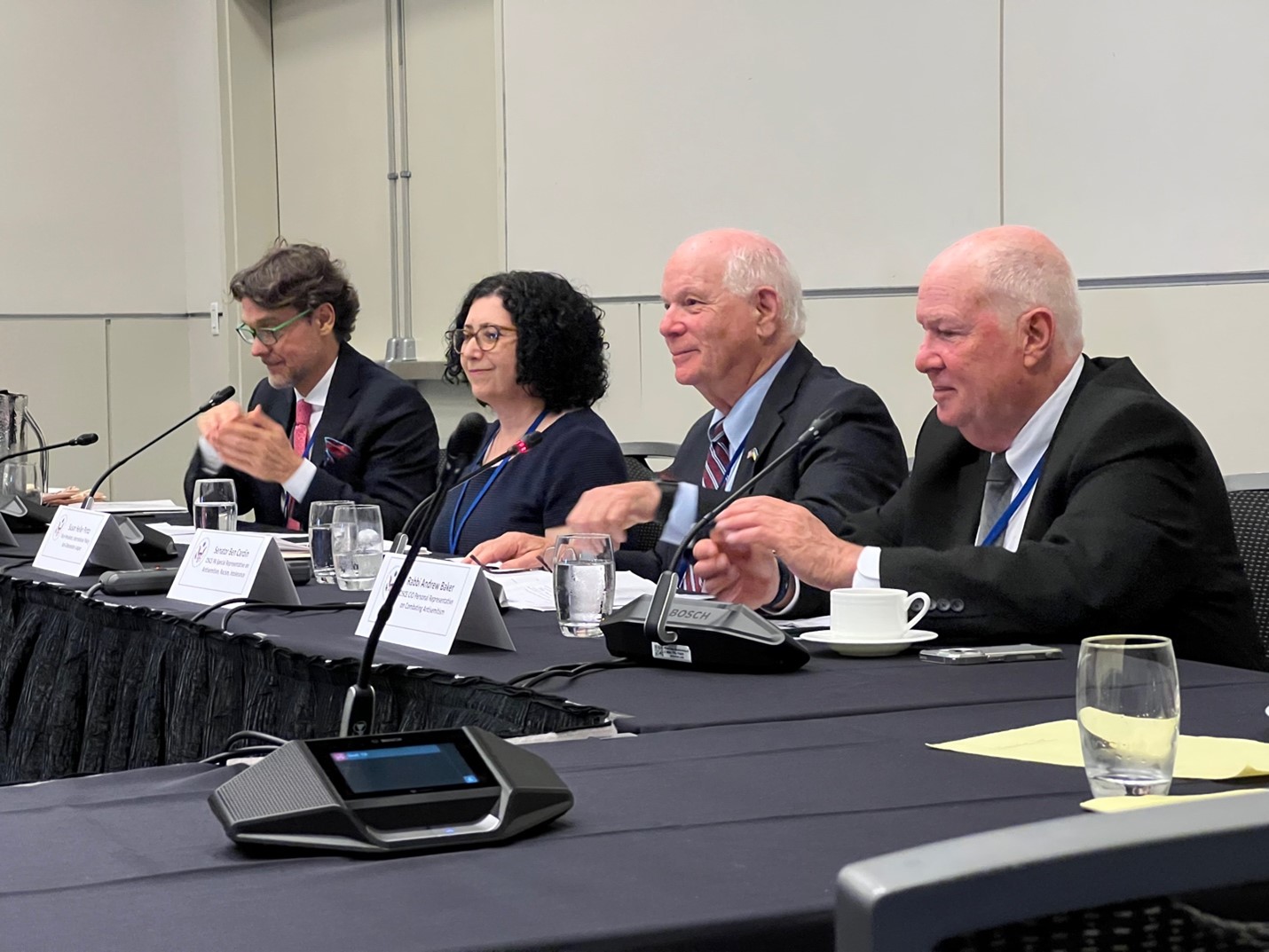
From right: Rabbi Andrew Baker, Sen. Cardin, Susan Heller Pinto, and Matteo Mecacci participate at a side event on countering antisemitism and other hate-based incidents in the OSCE region on July 3. (Photo Credit: CSCE)
On the sidelines of the Annual Session, the U.S. delegation held additional bilateral consultations with the Canadian and German delegations as well as with all three candidates for OSCE PA President, a visiting delegation of parliamentarians from the Organization of American States (OAS), and ODIHR Director Mecacci. Additionally, Rep. Moore and Rep. Veasey, respectively, participated in meetings of the ad hoc committees on Migration and Countering Terrorism, of which they are each members.







